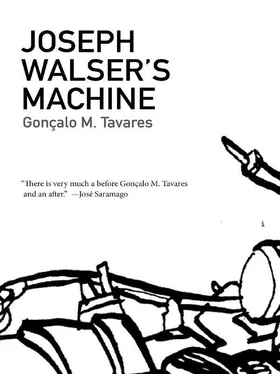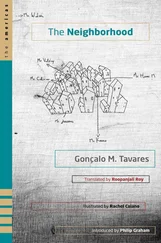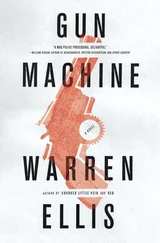“But there’s a disposition, my dear Joseph Walser, a disposition toward essential things for which we still don’t have names. Mankind tends to move along a line toward a certain end-point, that’s clear enough. You don’t have to study complex geometric patterns, any old fool knows very well what it is to be afraid, what it is to be terrified, and the whole city has this disposition.
“There are some men, however, who have demonstrated an excessive imperfection: some fled to the forest and, more than just carrying firearms, they’re shooting them, my dear sir. It’s an absolute abomination, this shooting they’re doing.
“Walser, my dear friend, I know your character and courage well, I know exactly what someone like you is capable of. Your enemies must be very afraid of you! You and many others like you are the cornerstone of this city, its center. You, my friend, will never leave here, you’ll never abandon your home, at least as long as the walls remain upright and strong, protecting your head from the cold west winds; you, my good sir, will never flee to the forest.
“You’re a man of good taste, Walser, it’s clear in every decision you make: an interesting wife, a house that’s perfectly in order, with good air circulation and smoke ventilation; maybe it even has a little garden where, every so often, when you’re not feeling well, you’ll disgorge the results of a mild convulsion in your stomach, brought on by too much wine. My dear Walser, as long as wine is still making its maternal way into your system, you, dear sir, won’t move a muscle in defense of your homeland. Your homeland, like that of all men who are at least sensible and reasonably rational, is circumscribed by certain holidays and years of peace. To be a patriot in peacetime is to be a coward, because it’s too easy! But you, Mr. Walser, don’t deserve such epithets, because you’re a man who inspires trust: we know exactly what you’re going to do, what side you’ll be on when it becomes clear which side has won. During times of confusion you retreat like any other animal with the ability to reason; your intelligence is admirable, Walser, and I know that the fact that you don’t talk much is just, once again, a brilliant strategy. You’ll survive, and you deserve to. You’ll end up illustrating — in an impeccable manner — the principal pages of the History books to come. I see in you a certain graphical intuition, a clear perception of where best to place the pictures of bombings and speeches transcribed from television, now translated into the language of those who had the most weapons at their disposal. You, Walser, are a particular sort of thing, what might be called a versatile worker, it’s in your eyes: you’ll do whatever is necessary to maintain your habits. Your urine will maintain a perfectly level concentration of elements from the beginning of the war until the end. It’s obvious that, on the inside, your body is made up of substances that do not change; it’s startling to even imagine you growing old. Your nature is that of an astonishing eternity; you’re a perfect copy of that which, in this life, is commonly called wise. When there’s confusion the sensible man retreats and the brave imbecile advances, that’s History, and you, my friend, are one of the main characters.
“It’s true, my dear Walser, I can tell that you have anxieties, but don’t bother with them, because anxieties are a drain on intelligence. I’m going to clear it all up immediately so that you don’t waste your energy unnecessarily. Dear Walser, never forget that you’re one of our best employees. Respect follows you wherever you go, in spite of your irresponsible shoes. But I don’t want to draw this speech out too long. My dear friend, my dear Joseph Walser, yes: I’m sleeping with your wife, and if you really want to know, I’m only somewhat enthusiastic about it. But I have no doubts about you, and I hope to never have any. Joseph Walser: I’m a great admirer of yours.”
Fluzst became more involved every day in activities seeking to disrupt the new human order of the city. At night he met with others; they whispered nouns, they lowered the intensity of the sound of their language, and increased the proximity of their words to facts. The words themselves did not act, but some of them did goad the body of the person speaking them so much that failing to act would become a cowardly obscenity, unacceptable for any man who wanted to be able to look at himself as though he were still a man.
They decided on locations; perhaps the city has been duplicated, and another, second city exists now at night. It’s useless to be mysterious when you’re the conqueror, but it’s essential when you’re in the position of the conquered. Only the strongest have the right to be redundant and predictable, monotony is the privilege of having attained a great height and a great clarity, the privilege of the light that is rationally distributed to everything in existence. Good illumination is a characteristic of strength; weakness plots and is so stingy with lightbulbs that this stinginess starts to become confused with its fears and its strategy. Fluzst had decreased the length of the phrases he spoke in public and had become reserved; he still hosted the dice game in his house on Saturdays, but the atmosphere had changed. There was now an aggressive judiciousness about all of them.
Joseph Walser is once again back in front of his machine. The work continues to move forward in a state of purity, uncontaminated by those things that are making other people suffer.
The companies in the empire of Leo Vast, who owns the factory, move on apace. The world is variegated, even within a single geographic space. A few square yards of earth can cover multiple corpses, stacked on top of each other, or they can bring forth the promise of a garden. Within a single city there are hundreds of cities; the mere fact of being a man isn’t enough to be able to found your own city, but it’s almost enough.
It’s like this: each survivor and each individual fear founds a hypothetical city, a metropolis, which is transitory and fragile, to be sure, but all metropolises are.
Joseph Walser is taking a little break right now, stepping away from his piping-hot machine, which is almost suffocating him after two straight hours of exertion. These pauses are becoming more and more important, because the excessive heat from the machine and his own fatigue get intermingled with the noise from the sirens that flood in through the windows during the brief silences of the motor, which is located just inches away from Walser’s chest.
Joseph Walser is getting older, but he still reveres “his” machine and all its inner workings. At various moments the sound of the motor and its vibrations get interwoven with the beating of his heart as well, for both of these “organs” are functioning perfectly, in a state of perfect excitation; they are pressed up against each other and thus start to become intermingled, which causes ridiculous jolts of alarm in Walser, from time to time, when, at precisely planned moments, the machine’s motor suddenly stops. It is at those times that Walser notices the connection between his body and the machine. These sudden stops cause an instantaneous, cold shiver to cascade over his skin: a brief sensation, and one so unpleasant that it prompts him, for example, to look through scientific textbooks to find a detailed description of what a person feels when his heart fails. Walser tries to figure out if the brutal division of the functioning of his heart from the functioning of the machine’s motor, whenever it stops, is anything like the division of a man’s heart from the man himself. He has read that a non-fatal heart attack is sometimes described in this way: the organ retreats from us, at great speed … but then it comes back.
Читать дальше












